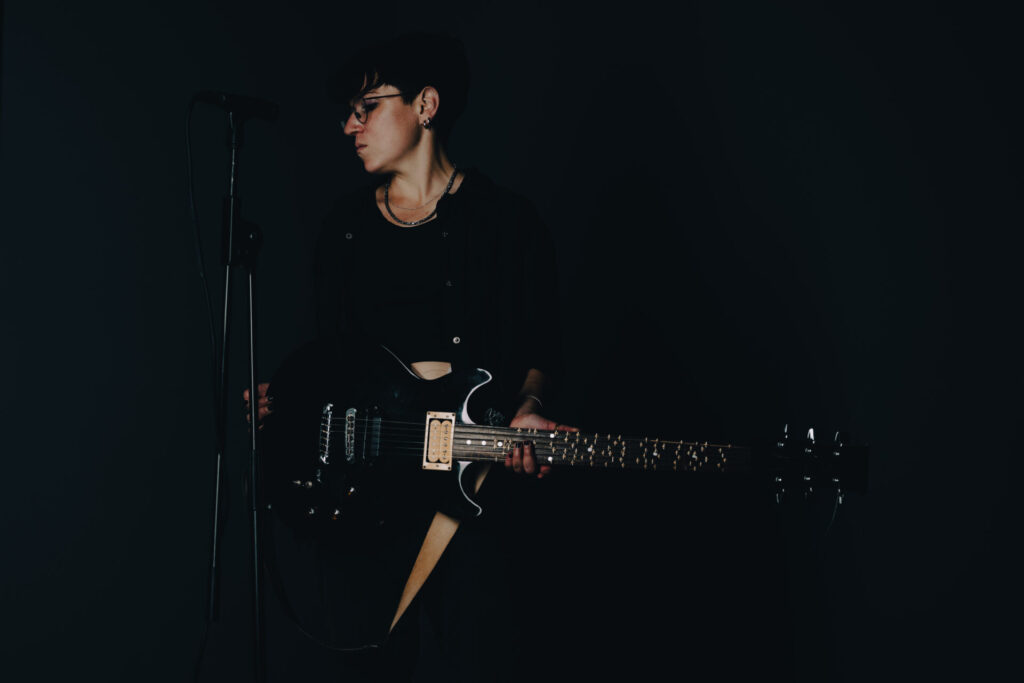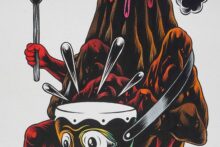Times of personal upheaval can drive us to look to something greater than ourselves. For some, it’s community or religion. For others, it’s the universe. For Berlin-based artist and composer Jules Reidy, the drama of experiencing the end of a relationship and finding a more expansive understanding of their identity manifests in the rich seam of mysticism running through new album Ghost/Spirit.
Ghost/Spirit has clearly been conceived as a whole composition rather than a collection of songs. It has a strong narrative arc, following a point/counterpoint structure with the ‘Ghost’ A-side and ‘Spirit’ B-side from the initial impact of heartache, ambling towards what might be found on the other side of it. The respective opening tracks, ‘Every Day There’s a Sunset’ and ‘Every Day There’s a Sunrise’, are direct counterparts with interconnected lyrics that set the pace for each side of the album. There are many through-lines on Ghost/Spirit, from the obvious title references to the more subtle repeated, dissonant, plodding musical phrase that first appears on ‘Interlude I’ and follows throughout the album. There are consistent reminders to the listener that they are accompanying Reidy on a journey.
Reidy repeats the line “I fell into your atmosphere” first on ‘Satellite’ and later amid a thick dirge of electronics and samples that swallow their vocals on ‘Maybe’. It’s a very particular line, one of few precise lyrical repetitions, delivered against a frenetic arrangement on ‘Satellite’ and an unravelling one on ‘Maybe’ in the same steady voice. Wrapped up in images of light and space is a person letting go of someone they love, wanting to be taken back and slowly accepting that it won’t happen.
Rather than having guest or session musicians on the album, Reidy was sent contributions by different artists playing drums, cello and bass. Though some artists like bassist Andreas Dzialocha are frequent collaborators of Reidy’s, it feels more suitable to describe them in the context of Ghost/Spirit as contributors. Reidy has sampled their work, sliced it up or drawn it out, adding to the album’s fractured sound. Reshaping this raw material is an extension of Reidy’s narrative control over the album, slotting in puzzle pieces rather than allowing unfettered influences in.
Themes of light, space, breathing and the earth abound on Ghost/Spirit, but the album is far from New Age gentleness. Friction plays a central role within each song, matching the emotional unease of Reidy’s lyrics. There is always some concession to interruption or distortion that prevents the songs from being harmonious or cohesive. Where Reidy’s voice is smoothest, it’s set against a choppy sample or jockeying rhythms.
This approach is part of what makes the fraught compositions of Ghost/Spirit a massive push forward in experimentation for Reidy, especially taking into consideration their recent works, namely 2023’s Trances and 2024’s ‘Rave Angels’. Trances played as variations of extended, slow-moving meditations and embraced a singing-bowl rhythmic flow. For all its lines about breathing, Ghost/Spirit has a decidedly non-meditative musical and lyrical tension. Reidy’s guitar playing on Trances fit as part of the movement of songs. It’s now a statement of self, often at odds among cut-ups of electronic rhythms and patchwork samples of drums and cello.
The soft shimmer from the twenty-minute long ‘Rave Angels’ isn’t completely lost. There are still delicate chimes and programmed electronics that have the friendly sound of a mid-century idea of what the future’s machines would sound like. But Ghost/Spirit is denser and has more dissonance, abrasion, and percussion. Even ‘To Breathe Lightening’, which follows conventional rock song structure with regard to rhythms and a chorus, contains some of the broadest textural contrasts: the guitar is a blister, the vocals are jagged with distortion, the percussion rings with hollowness.
The album is filled with drawn-out sounds that skew more slowcore than fully droning. The midrange frequencies of sustained guitars and sampled cellos float through delicate, indecipherable rhythms that could be analogue or could be programmed. These rhythms play as something light and almost teasing against the distorted and solemn stretches of guitar and disjointed vocals on ‘To Breathe Lightning’, and the weedy cello on ‘Interlude I’ that fills in the spaces between Reidy’s restrained guitar playing and the harmonics that splash into each other like weird raindrops on a pond.
It’s through slowcore’s ambient lens that the folk influence on Reidy’s abstract arrangements becomes visible. There is frequently a lugubrious approach to their finger-picked guitar playing that utilises the instrument more for its tonal qualities, its firmly metallic timbre, rather than its melodic potential. On ‘Search Light’, the guitar is not a rhythm instrument, it is a stumbling figure in the haze, something to focus the mind on. It immediately follows ‘Breaks’, the most straightforward acoustic guitar song on the album, and it feels miles apart from it. Even then, Reidy has still ensconced ‘Breaks’ in shimmering, chiming electronics that sound like glockenspiel, but are obviously not acoustic (only because they are set against something acoustic). But it provides a kind of guide for the abstraction elsewhere on the album, a reference point for when individual parts get boiled down to the point of being unrecognisable, against the friction of overlapping rhythms, samples, and field recordings of local trains and church bells all colliding into each other.
The folk guitar influence is most apparent on ‘Satellite’, with Reidy’s finger-picked style eventually falling into syncopation as the rhythms of the song gather an inebriated, stumbling momentum. While many of Ghost/Spirit’s songs feel like elements are ricocheting off of each other, ‘Satellite’ builds up an unparalleled chaotic energy. There is nothing aggressive in this chaos – for all the raw edges on the stitched-together pieces, the album is melancholic rather than aggressive, even when seams sound like they might come apart. Reidy’s voice is calm throughout, until it is blotted out by distortion and becomes a blurred snapshot to catch a glimpse of.
In some ways it’s easier to express the wild energy and emotion of loss than of what comes after. The ‘Ghost’ A-side of the album reads easily as a break-up album. The narrative on the ‘Spirit’ B-side is strong but less direct, to the point that the songs lose something when listened to out of order. The first four tracks could be a seamless entity, and ‘Every Day There’s a Sunrise’ and ‘Spirit’, in particular, feel like two halves of the same song. Friction is created by splitting the songs up, as though Reidy is slowly pulling apart an intense knot. The conflict and intensity begin to ease and unravel across these interconnected songs. ‘Interlude II’ provides a fadeout of the chapter into the instrumental ‘Letter’, led by a frustrated acoustic guitar. It’s only without words that Reidy is able to draw a firm line under the most pronounced chapters of heartbreak of the album.
The mood is noticeably different on ‘Splits the Light’, a soft, wordless vocal buoying Reidy onward on the most optimistic track of the album. Light is the guiding lyrical force, but the earth is introduced as a new element, a literally grounding one for Reidy that connects them to the physical world as their lost love drifts further into the distance.
As is often the case with the acceptance of loss, it comes as a subtle shift rather than a grand epiphany. The conclusion of Ghost/Spirit, ‘You Are Everywhere’ is not some bombastic declaration of freedom or enlightenment. It is the same meandering guitar, albeit with a subtler backing arrangement. But it’s also where Reidy’s voice is strongest on the album, present and resolute at the end of this journey. Maybe it’s a product of giving themselves over to something greater, or maybe it’s that confronting the hurt will help anyone find resolution, but Reidy leaves us with the intimation that peace of mind can be found in this process.



